- Home
- Al Sarrantonio
Totentanz Page 14
Totentanz Read online
Page 14
"Frances, are you all right?"
The doctor approached her bed. His shoes had rubber soles that made a slight squeaking noise as he walked. His face, now furrowed as he bent over her, was as kind as it had been when he talked to her in the other white room; his body gave off warmth.
"What's wrong, Frances?" He felt her forehead, took her limp hand, held it.
She said, "I . . . nothing."
There was something about him that calmed her, something about the assurance he had given her that made her feel he might have been sent—maybe by Him!—to save her. He had taken her from that ward of madwomen, put her in this room by herself. He would heal her, make her whole again, and cleanse the memory of the other from her.
"Are you sure nothing's wrong?" he asked. "Should I send for something to help you sleep?"
"I'm all right."
He looked at her sternly, and then smiled. Despite herself, Frances smiled too.
"That's better," the doctor said. His white hair smelled of oil, anointment. His eyes had moved to the Book on her lap, and she rested her hand on it.
"Thank you," she said.
He smiled and settled himself next to her on the bed.
"I'm a Bible reader myself." He looked away, and his face assumed a serious expression. "Do you know why you're here, Frances? Do you remember anything of what happened before you . . . slept?"
She waited a long moment before answering, "Some."
"Do you feel we should talk about it now?"
She hesitated again, probing her feelings. "Not yet."
"All right, then. Whenever you feel ready." Suddenly he put his large, warm hand on hers, both their hands settling on the Book. "I want to help you, you know. You must love life very much to have come back this far.”
"I know," Frances said, and again she found herself warming into a smile.
Somewhere far in the recesses of the hospital, someone gave a piercing cry and then was silent. The doctor was looking at the window, at the falling darkness outside. There was a strange expression on his face. He looked as though he were battling with himself over some dilemma. Once again there came a short cry from far off, and then silence.
"Frances," the doctor said in a low voice.
"Yes?"
"You're very sick, you know that?"
"I know that, Doctor."
"I want to help you."
His voice had changed, was less soothing.
"You're a very attractive young woman, Frances."
He was a different person now. The broad, soft features had steeled; the gray, moist eyes hardened into walls. The kindly exterior had been pulled inside to reveal something animal-like, mindless, filled with blind force.
"Let him kiss me with the kisses of his mouth," he gasped, "for thy love is better than wine."
He put his hands on her arms, pinning her against the pillows. "It won't do you any good to scream," he said, "because no one will care. They all know you're a sick woman." He stood up and fingered the belt on his white smock trousers. Frances stared at his large hands, at the trousers, at the belt. "No one would believe you," he said again. "When I first saw you, when you were confined to a ward at the county hospital, I knew I had to have you here." He was speaking as if she was not in the room, as if he was alone, repeating a litany to himself. "Strange things happen all the time in places like this, and no one cares." He loosened his belt, and his trousers slid down. Frances saw that his legs were thick and hairy. "You understand all of this, don't you?"
Frances said nothing but only stared, terrified, at his thick legs.
The doctor was lost in himself now; he pulled his underpants down quickly.
"I don't want you to say anything. I don't want you to scream or call out." He talked in little breaths as he moved toward her.
Frances' eyes were locked to the thing between his legs. It was the thing the boys around the schoolyard, and sometimes Billy Bayer after Sunday school, called "cock." Once she heard Billy Bayer call after her, in a voice that was taunting but at the same time hushed and uneasy, "You want to touch my cock, Frances?" The thing between the doctor's legs was bloated. She knew what that meant: sex. Down deep inside she tightened like a spring, and her insides went cold as though water was soaking her all over again.
"I won't hurt you," the doctor said. He was next to the bed, bending closer to her. Frances stared at the thing between his legs—it reminded her of something. . . . The bed creaked, sagging as the doctor kneeled on it, and suddenly everything dawned on her. As the doctor's cock moved closer to her, as he arched it up over her, she looked at it and it came to her what it was. It was something else, long and serpentine, uncoiling, growing longer and longer
A hose; it was a long and evil hose, and the full memory of Jeb unlocked in her brain and she was standing next to the truck waiting for Jeb, holding the Book that he had mysteriously told her to take. The truck was gaily painted with circus clowns in red, white and yellow and had big flowers on the doors; and on the back of the tank, where the hose was wrapped, was the word 'FUN!' spelled in large, crooked, balloon-like letters.
She was alone next to the truck, and then she heard Jeb's boots crunch on the gravel as he approached. "Into the truck," he said, and as she climbed up, there was a roar, and the barn and the house exploded into high flames. Frances saw a row of Jeb's paintings, neatly stacked on the front porch, melt in a riot of colors and disappear into orange fire.
"Jeb—" Frances began as he climbed into the cab, settling himself down, but her words died in her throat. The face he turned on her was not his, was worse than any face she had ever seen on him before, a mix of his own face and white bones, something possessed. He gunned the truck into loud life and they pulled out, leaving a mountain of flame and a growing burned stench behind.
Jeb was silent, but as the art fair rose into view, his lips stretched into a cracked smile. He turned his hard eyes for a moment on the little cluster of roped-off tables where paintings hung on clothesline or were strung from boards; then he turned them back on the road again.
They circled the art show, slowly. At first no one noticed, but then a few children caught sight of the painted truck. Soon others, adults bored with ill-defined landscapes and paintings of children holding flowers, gathered at the perimeter. At each appearance of the truck, they cheered.
"Drive," Jeb said, pulling Frances by the arm over to the driver's side.
"Jeb—"
"Do it," he said, squeezing her arm tight.
She slid across the seat, noting that the spot where Jeb had been sitting was still cool. She kept the truck moving in a slow circle, arching her back to see over the steering wheel and out past the hood. Jeb climbed over her and out the passenger side onto the running board. He slammed the door behind him and made his way to the back of the truck, where he threw a switch, and then twin horns on the roof of the cab began playing loud circus music. Another cheer went up, and someone said, "That's Jeb." A hush fell over the crowd until Jeb waved and grinned.
Slowly he began to unravel the hose at the back of the truck. It had a huge bronze nozzle, and he suddenly twisted it, sending a fine spray of rainbow colors out over the spectators. Bright dots mixed in midair, forming beautiful shades, then separated to combine with other colors in a continuous shower of bright glitter.
"Jeb's painting us a picture in the air!" someone said.
The truck circled. Everyone from the art show was watching now. Jeb spun the nozzle to a tighter spray so it would reach out over them all. On the second pass, the colors hung a little longer in the air and didn't dissolve as quickly, some in the crowd began to complain that little oily bits of color were sticking to them. Jeb wound the hose in. There was another small hose, set in the side of the truck. Jeb pulled it out and snapped the nozzle open. Flame leaped out, catching those in front and setting them instantly ablaze.
There was panic, but it was already too late. The flames spread through the air, each dot of color exploding
into a miniature fireball, the heat leaping from one to the next in a tornado around the art show.
As Frances saw the flames wrap around the crowd in front of her, she pulled her foot from the accelerator. "Keep going!" Jeb shouted menacingly from the back, but she sat stunned. The door opened with a loud creak, and he pushed her aside roughly, jamming his foot to the gas pedal. The fire quickly spread from the outer fringes of the crowd inward: there was no escape. A heaving, flaming ring of people were trying in a mindless rush to find some way out of the fire. Frances saw some of them go down in the wake of a forming stampede. Some tried to move inward, but this was no escape because the fire was spreading in all directions. The art pieces now caught fire, and tongues of multicolored flame were licking across clotheslines and outlining wooden walls and tables.
Frances began to weep, her eyes fastened to what was happening. Jeb made one more slow arc around as, with a great whoosh, the judging stand in the center caught fire, balling into heat all at once, its red-and-white painted sides mingling and then disappearing into a globe of yellow and blue. The flames were still spreading outward. As Jeb pulled the truck into a leaning turn away, Frances saw, just at the edge of the fire, a little girl wandering in a circle bordered by the inferno, shouting, "Mommy, Mommy." The circle swept in at her like a closing iris.
Frances screamed and grabbed at the steering wheel. Jeb pushed her back against the seat, but she had taken him unaware. As he fought to regain control of the truck, it swerved wildly, back and forth, and then tipped over. As Frances climbed out, she saw Jeb escape behind her. Somewhere she heard "Mommy. . .” and then silence.
Jeb looked stunned, confused; he stared dumbly at the wall of fire for a moment, and then a wail of despair leaped from his throat. He sounded like a wounded animal. Frances put her hand on him, and he looked down at her as if seeing her for the first time.
"Go away," he said.
"Jeb, we have to get out of here." She saw now that she was still holding the Book in one hand, had been clutching it all along.
"Go!" Jeb said, and his face had that look on it, that look of caring, that she had seen so rarely but knew was always there. "Run," he said desperately. "1 can't be with you anymore. For God's sake, love only life."
"Jeb!" she shouted at him.
And then he screamed, but not for her. His arms, black and red, flew up over his head, reaching for something above him that wasn't there and couldn't be reached. His knuckles cracked and ripped with the strain, his thin arms and hands and each finger, each stretched muscle, standing out taut against the flames behind him; and then his mouth opened, and opened, and the scream got louder and louder as his mouth became wider and wider, the lips pulling away and the skin peeling back from the face, the skull and skin and blood flying and flaking from his bones. Still the scream continued. The naked skull, with its horrid bone mouth screamed, and the eyes, melting away, leaving black holes, still pointed at the sky. The whole skeleton strained. The scream reached its peak—and Frances put her hands to her ears as the bones turned in an instant to dust. For one moment Jeb's skeleton hands reached out to her, empty eyes pleading with her—and then there was a huge inrush of air, and the bones flew to bits and were gone, sucked away into the fire.
For a brief moment there was silence. Frances pulled her hands from her ears. She heard a roar and she looked up to see a wall of flame advancing on her, and in the midst of it, an uncoiling hose, its nozzle undulating like a snake's head. She held out the Book to keep it away, and above the roar came a deep, mirthless laugh, a hollow rumble of laughter.
She held up the Bible, and the doctor hesitated above her. The glazed look in his eyes cleared and he opened his mouth to speak, but nothing came out. Someone was laughing in one corner of the room. The doctor fell back, his face turning as red as blood, and dropped away from her to the floor. After a moment he was still, his heaving chest as hard as rock. Frances stared at him, at the dead, wilted hose between his legs, and then there was a noise from the corner of the room.
She dropped the Book and lay back against the starched pillows, frozen.
Someone backed toward the window, and she saw the outline of a thin, short coat as the figure settled itself against the wall. There was a tiny flash of blue light and the sound of someone drawing on a cigarette. A dark plume of smoke drifted up across the screen.
Frances lay motionless. Her hand went out, feeling for the Bible, but she could not find it.
"Leave it," Ash said, and he smoked for a moment before saying anything more.
"Did you miss me, Frances? It's been a long time."
She was shivering as though she were back in that wet room again, wearing those starched, wet clothes.
"I thought you would have missed me. I was holding your hand always, you know."
His hand rose lazily, outlined like gloved bone against the window.
"Thought I was gone forever?" Ash queried. "Thought that with Jeb's passing I would dissolve also?"
Frances pressed herself into the pillows, trying to shut him out.
"What did you think, Frances?"
He came to her bed, stepping over the silent body of the doctor, looming over her. His head came down to her face. She felt a cold space envelope her, as if all the heat in the room had been sucked away, leaving a vacuum. She could breathe, but still she choked. His face, his non-face, was like a balloon being lowered by an invisible hand. There was a mouth but no mouth—the maw of a fish turned inside out. The eyes were there except when she tried to look directly into them. His flesh was too white; the red line around his mouth was not red, but merely the absence of every color save red. He was solid, and yet he was not there.
She wanted to whimper, to cry out for mercy, but could do nothing except stare up into the face that sank slowly, slowly. . . .
"Kiss me, Frances," the non-mouth said. It opened into an oval, and inside it she heard a rushing cold wind and saw only blackness.
"Kiss me. . . ."
She threw her hands up in front of her eyes against the horrible cold and black, and then she was off the bed, her hand brushing over something hard and grabbing it, and out the door and in the corridor, empty, neon-lit with light-blue floor tiles and white walls. There was no sound from either end of the hallway. She moved toward the front of the building, past the guard asleep by the desk and the nurse at the admissions counter, her back to the reception area and her ear to the phone—"I don't care what he says, he'd better have that goddam alimony check to me by Monday, or my lawyer. . . ."—and then she was through the double swinging doors and out on the front walk, white concrete leading twenty steps down to a long, sloping lawn and a gate just swinging open to let a long, black car through. She ran out after it, stopping a block away under a dull street lamp in the night, alone. She looked down and saw that she was clutching the Book. She looked up at the street lamp, at the light on the top, and at that moment it became the Northern Star.
She wandered away, but the star stayed with her, and as she prayed, clutching the Book to her breast, muttering into the night, praying only for life, the veil came down around her. . . .
But it will happen again.
Now.
"This will be better than the first time,” Ash said. His death mask spread into a grin. "This will be better than all the times. Do you know why, Frances? Because I am the resurrection and the life: he that believeth in me, though he were dead yet shall he live. And whosoever liveth and believeth in me shall never die." He bent down over her. "Do you believe in me, Frances?"
She looked up at him, and she knew it was true. He had been the Northern Star, the veil that had dropped upon her, to lift and fall again and again. There had never been, never could be, salvation. She was lost and always had been. Abomination. So there had been no third Him after all, only him she sought to push away (who had suckled her all along) and him she mourned. Jeb. Her brother. Her father. The Northern Star, the Book, had been illusions, hope turned inside out. There woul
d be no redemption.
She let the Book drop at her feet and looked up. Ash's strange, grinning face was as the rising sun.
The Northern Star.
"You can love me just as much, Frances." he said.
"Yes."
His face lowered, and then his lips touched hers. It was as though magnetic poles had been reversed within her; white had become black. She felt no great hatred, but rather a great love moved from north to south. Yes, she thought; yes. Ash's lips were locked upon her, and she drew deeply of his kiss. She saw a long tunnel, a burst of far light that rushed toward her but was quickly extinguished. Something within her, her single precious thing, was gone, and in its place was another love, equally—if oppositely—fulfilling.
Yes.
She opened her eyes, and Ash was there, smiling, bathed in a blood-warm light, his face flushed and satisfied.
"I waited a long time for you, Frances," Ash whispered. "I knew that when I finally had you, you would be all I ever needed."
"Yes," Frances said. Yes.
It will happen again. Now.
And again.
And again.
THIRTEEN
Plain as day, Mayor Poundridge had seen his dead father waiting for him just inside the gates to the new amusement park. Plain as day, he'd seen that bemused, tolerant look, the look that said, "You're my son, and you'll do all right," and the ache of recognition and remembered loss had grown so strong that all other thoughts had disappeared. Despite the impossibility, not an atom of doubt had been in his mind. It was his father; he was alive again, period. Only joy and reunion could follow.
But where was his father now?
And where was Emily?
Emily had been right behind him as they rushed up to the gates. When he saw the swell of people begin to gather there, he'd felt it was his duty to be the first through—to say something to them, to make the occasion official. Heck, it was his privilege. Some were in their nightclothes, but most wore light summer shirts or blouses and pants. Most looked expectant, but some looked downright joyful—like that Reggie Carson's mother. She was staring at the sky, and Poundridge had looked up just in time to catch sight of a plane, long and sleek, before it was lost in the glare of the lights. Hadn't her husband died in a plane crash?

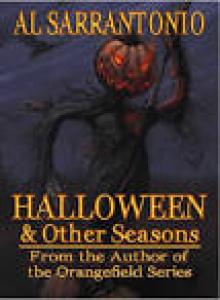 Five World Saga 01 Hornets and Others
Five World Saga 01 Hornets and Others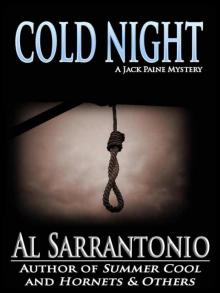 Cold Night (Jack Paine Mysteries)
Cold Night (Jack Paine Mysteries)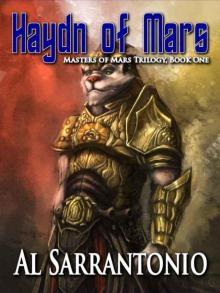 Haydn of Mars
Haydn of Mars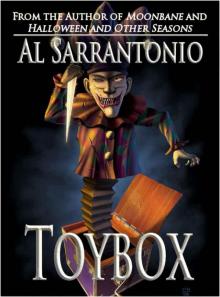 Toybox
Toybox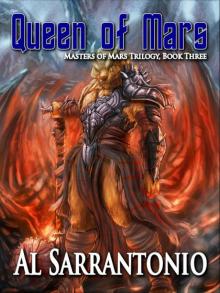 Queen of Mars - Book III in the Masters of Mars Trilogy
Queen of Mars - Book III in the Masters of Mars Trilogy Exile
Exile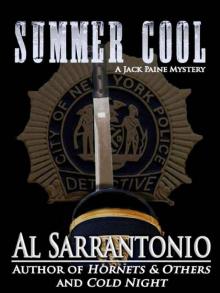 Summer Cool - A Jack Paine Mystery (Jack Paine Mysteries)
Summer Cool - A Jack Paine Mystery (Jack Paine Mysteries) Return - Book III of the Five Worlds Trilogy
Return - Book III of the Five Worlds Trilogy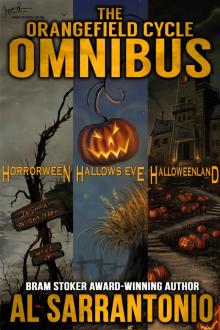 The Orangefield Cycle Omnibus
The Orangefield Cycle Omnibus Summer Cool jp-2
Summer Cool jp-2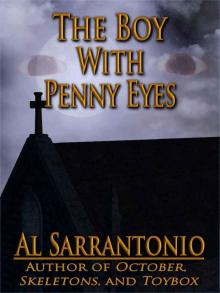 The Boy With Penny Eyes
The Boy With Penny Eyes Journey - Book II of the Five Worlds Trilogy
Journey - Book II of the Five Worlds Trilogy Kitt Peak
Kitt Peak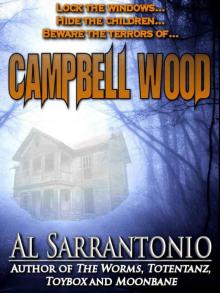 Campbell Wood
Campbell Wood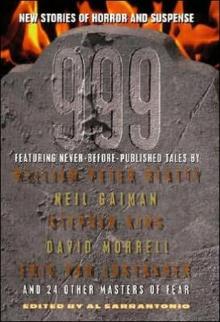 999
999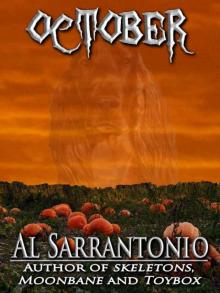 October
October Sebastian of Mars
Sebastian of Mars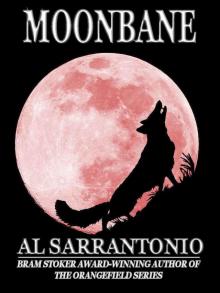 Moonbane
Moonbane Totentanz
Totentanz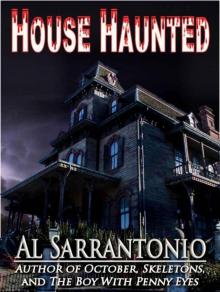 House Haunted
House Haunted Halloweenland
Halloweenland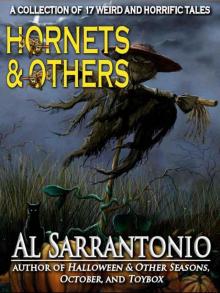 Hornets and Others
Hornets and Others